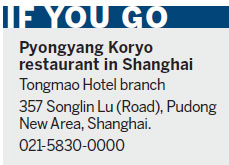Women rock out 'Pyongyang Style' at restaurant
Updated: 2014-04-20 08:01
By Matt Hodges in Shanghai(China Daily)
|
|||||||||
Certain topics are off-menu at the Pyongyang Koryo restaurant in Shanghai, such as DPRK leader Kim Jong-un's ex-wife, or late uncle, or even the reclusive leader's relationship with former NBA player Dennis Rodman.
So with lower expectations amid the barbecued bulgogi, pan-fried cod and blood-red kimchi, I waved over one of the flower petal-pretty waitresses at the chain's Tongmao Hotel branch for a less controversial enquiry - about her musical tastes.
"Have you listened to Gangnam Style"? I asked, referring to ROK singer Psy's parody of wealthy Seoul residents' love of conspicuous consumption. Released in July 2012, it still ranks as the most-viewed video on YouTube with over 1.9 billion hits.
She hesitated, smiled, nodded and began backing away, leading me to press my luck. "What do you think of it?" But she was gone, and with her my last chance of the night to learn more about what goes on inside the minds of those who inhabit the reclusive state. Or so I thought.
In the end, grilling the wait staff for clues and watching the propaganda-laced singing and dancing routines proved more appetizing than the restaurant's pan-Northeast Asian menu. The chain has three outlets in Shanghai, plus a separate cafe bar at the aforementioned hotel.
There are two reasons for this. First, like the prevailing mindset, the portions of samgyopsal (pork belly) and galbi-sal (beef ribs) are served pre-cooked, which takes the fun out of eating Korean barbecue in the first place.
We ordered plates of meat ranging from 40-180 yuan ($6-29) a portion, but you can get the whole shebang in an assorted, albeit lukewarm, mix for 228 yuan. An assorted plate of kimchi, or spicy fermented vegetables, costs 40 yuan, and a steak 128 yuan. But most people don't come here for the food.
Second, the expected side dishes of saber-rattling anti-US propaganda never really materialized. My friend's wife ate in one of the private rooms a few weeks earlier and found herself treated to a rhetoric-rich anti-imperialist speech. In that respect, we all left disappointed and undernourished. We were also banned from taking photos, but the same rule didn't apply to the table of Chinese next to us. They were granted two each.
If the restaurant is a fair reflection of local life, here's what to expect of any trip to its capital: Guitar-strumming rock dudettes who belt out inspirational songs from the Rocky soundtrack, no cult-of-personality images of its leaders, and bottles of soju that cost 10 times more (from 168 yuan to over 700 yuan) than they do in Seoul. Beer is considerably cheaper.
The Korean food is middle-of-the-road and fairly expensive. The menu contains a mishmash of barbecued meat and grilled fish, Japanese sushi, and standard Chinese dishes and soups. About 700 yuan could get a party of two decently fed and rosy-cheeked if you order the cheapest liquor.
But no trip here would be complete without viewing the 7 pm show, which features an ensemble cast of stiletto-wearing beauties, and ends with dancers in traditional dresses dragging patrons onstage for a few awkward but well-intended pirouettes. Amid all this, the saxophone rendition of Rod Stewart's We Are Sailing came as a surprise.
The 30-minute show was not always easy on the ears. Instead of barbed anti-American lyrics, there were fluffy songs about climbing mountains. One middle-aged Chinese man at a neighboring table summed it up fairly succinctly. "Just ... weird," he said.
This place is not a clone of Pyongyang. There are no men on the staff, for example, and plenty of pasted-on smiles. The folk songs seemed like the musical equivalent of bibimbap, the south's favorite mixed-rice dish. They were part-Peking Opera, part trot.
After speaking to several waitresses, who get one day off a week, both notions seemed a bit far-fetched. They said they like to visit the city's parks when they're not working. One said she can only go home after completing her three-year contract.

The decor - floor-to-ceiling wall mirrors and former Soviet-style chandeliers - lent a pall of decadence. It felt as though for every element of artifice, we were compensated with glimpses of something deeper and more real.
But whereas restaurants in Pyongyang are often obliged to display reverential images of their leaders, the closest on offer was a brief image of founding father Kim Il-sung on a flatscreen TV during a karaoke song. The irony of it being a Samsung TV seemed lost on the waitresses, who sported identical make-up and braided ponytails.
"Oh we have lots of Samsung TVs in Pyongyang," said one in fluent Chinese as she poured industrial-size shots of soju, the distilled liquor that defines life south of the inter-Korean border. "Do they have them in South Korea? I don't know."
Like many reporters' trips to Pyongyang, the experience left me feeling surprised at the unexpected warmth of the people when they let their guards down, but disappointed at what little they reveal of their thoughts.
I left with that Rocky track still in my head, wondering if Pyongyang locals play it on their Samsung stereos at public events, or on counterfeit Beats by Dre headphones before going to bed.
matthewhodges@chinadaily.com.cn
(China Daily 04/20/2014 page28)